At fifteen years old Tavaris Sanders vowed to change his life from the cell of a juvenile detention center. Three years later, after shuffling from group homes to foster homes, he has earned a full academic scholarship to Connecticut College. Three Bags Full narrates his struggle to hurdle the social, academic, and cultural barriers that come with success in higher education in America.
This is Tavaris Sander’s story. It is his lived truth and not mine. As such he will narrate the story, in his own words. This piece was published in the Chronicle of Higher Education and uses excerpts from a joint interview of Tavaris, which I conducted with a writer from the Chronicle, Lawrence Biemiller. The piece as published in the Chronicle of Higher Education and The Washington Post
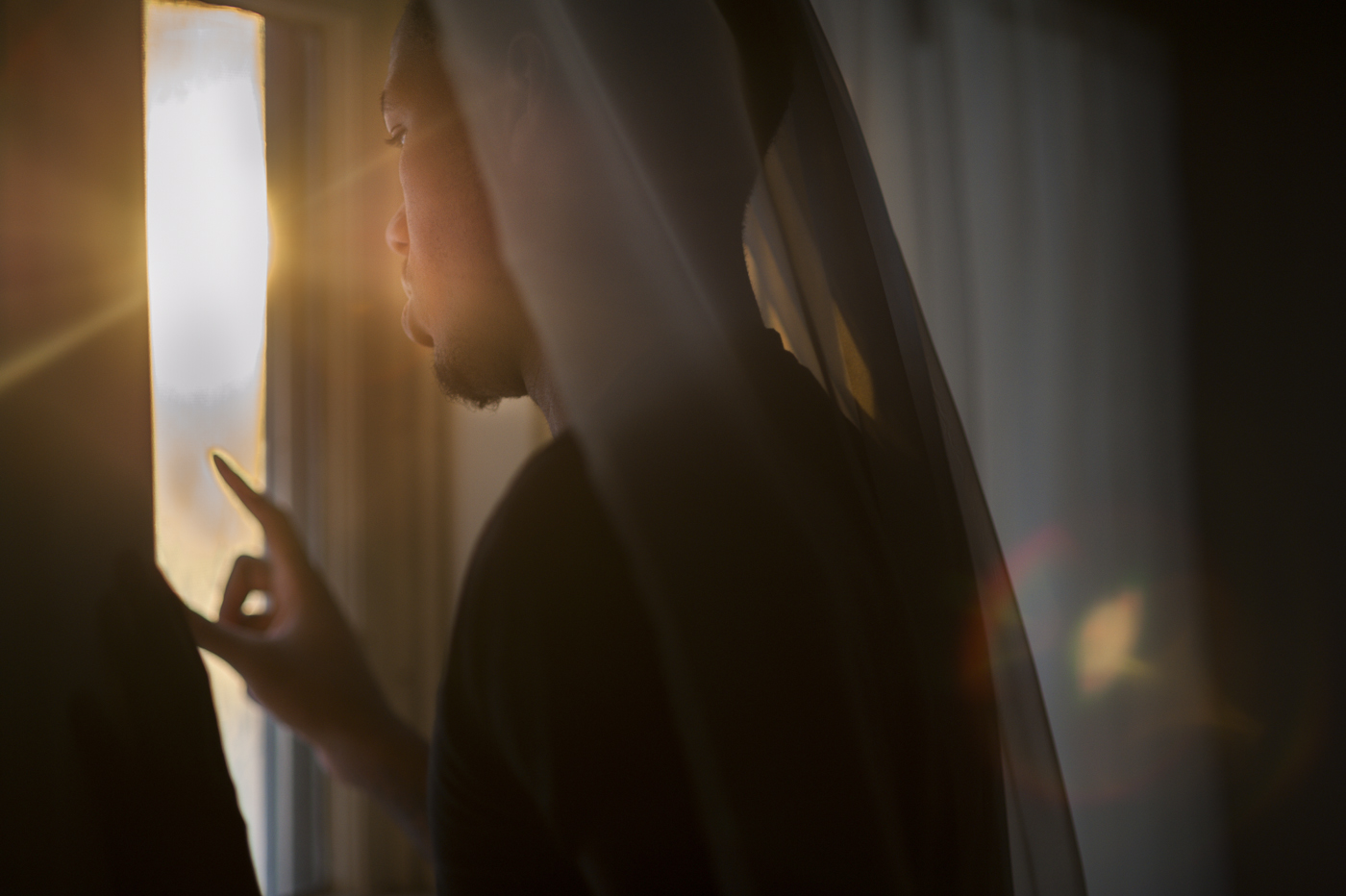
In this picture, I'm confused. I just got home [back to chicago from college]. I was planning on dropping out — I'm not even gonna lie to you. I wasn't even gonna tell nobody. But I'm like, Yo, this is not the same. I don't feel the same at all. My homies was doing gang signs and stuff. I was like, Oh shit, I forgot all about this. I used to love that — I used to love being around my homies, chillin' and stuff. After seeing, like, what I have ahead of me, the gift I got, like actually going to college, seeing my homies all living in somebody's house that they don't even know, having parties and shit, I was like, Yo, I don't have to be here.
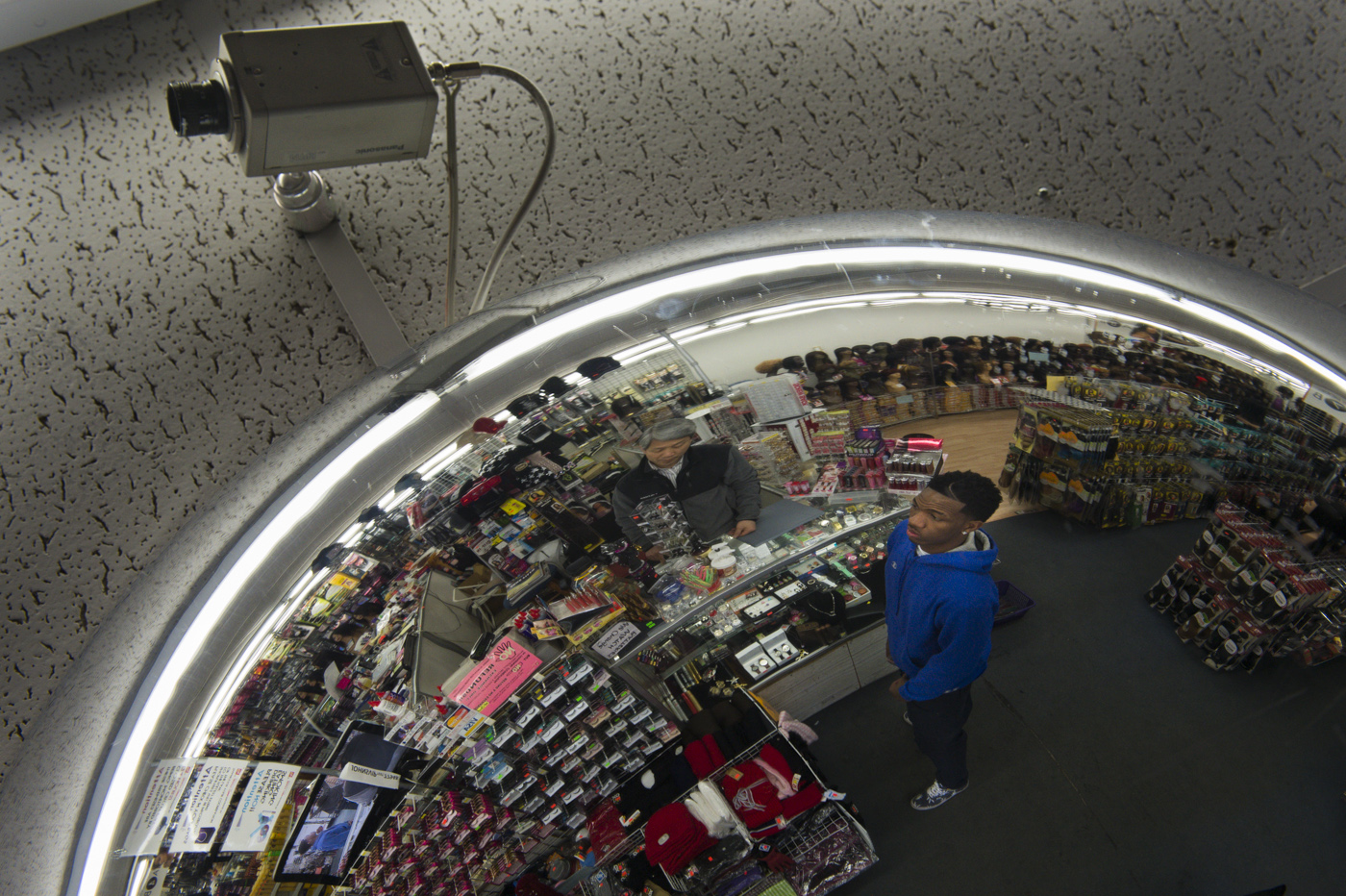
Here I'm back in the city. I'm back with the homies, you know. This is me coming back, getting my hair cut, fitting back to where I belong. And getting ready to go back to the streets, 'cause I was home now. I always go to the West Side, because that's where I lived before. I'm from the South Side, but I don't go over there, because people always killing each other. And my family is over there, like my grandma and stuff, but she has a tumor.
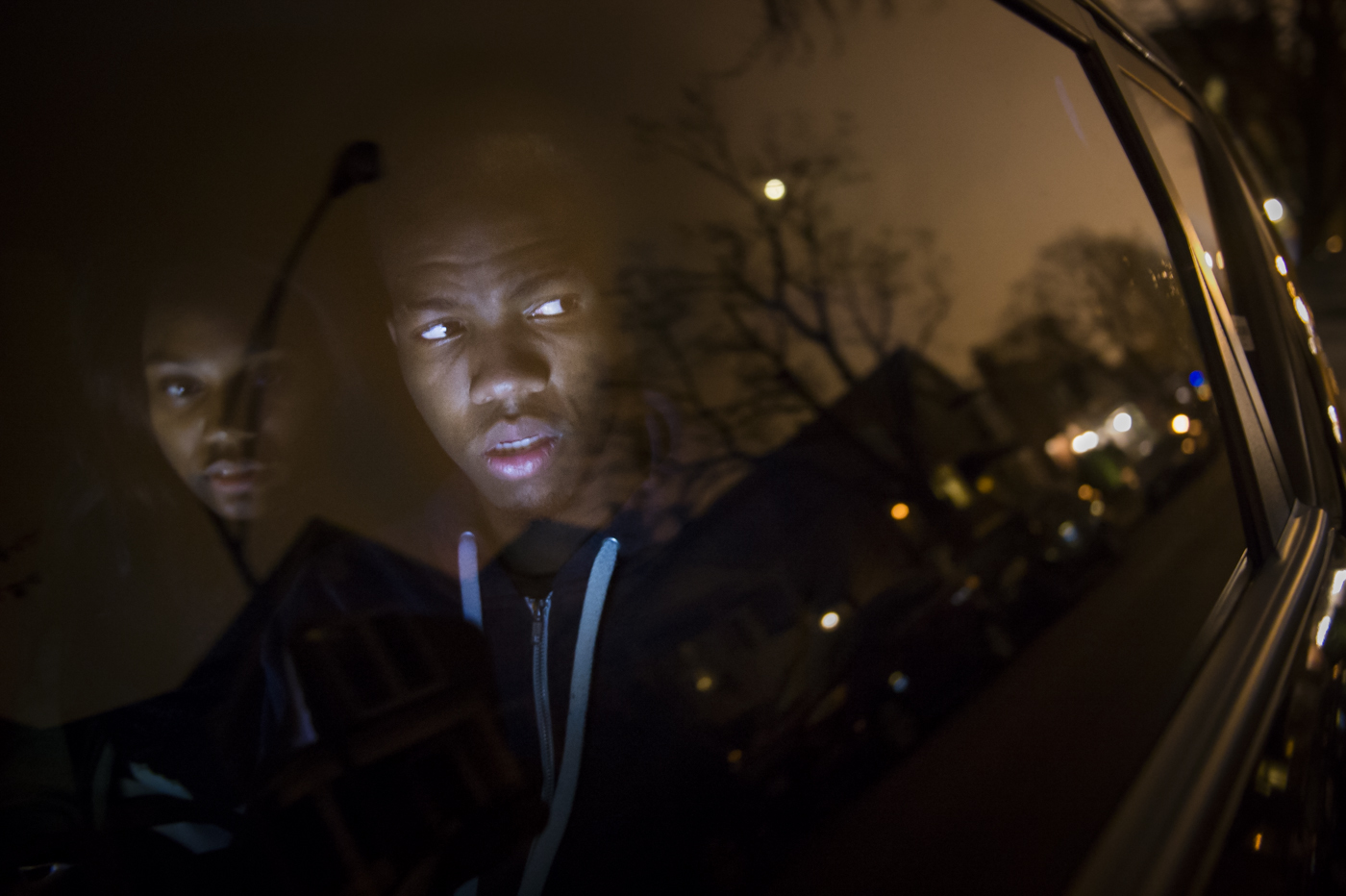
I decided we should go see my family. And I just see how the hood in Chicago, the South Side, is devastating. The houses are messed up. Look at the clothes I'm wearing — I'm wearing like college clothes. I have an H&M hoodie on. I'm like so different. I'm like, Yo, this is mad weird. It's not like, Why am I here? It's more like, Do I belong here?
And I'm like, where's my grandma? She's at the Kingdom Hall — she's a Jehovah's Witness. I hadn't talked to my grandma in a year. I wanted to see how she was, and I found out she had a tumor, she's on these drugs. I put her through a lot, and I felt like maybe I should apologize, let her know, like, I really care about you, I love you still. I came back and she wasn't even there.
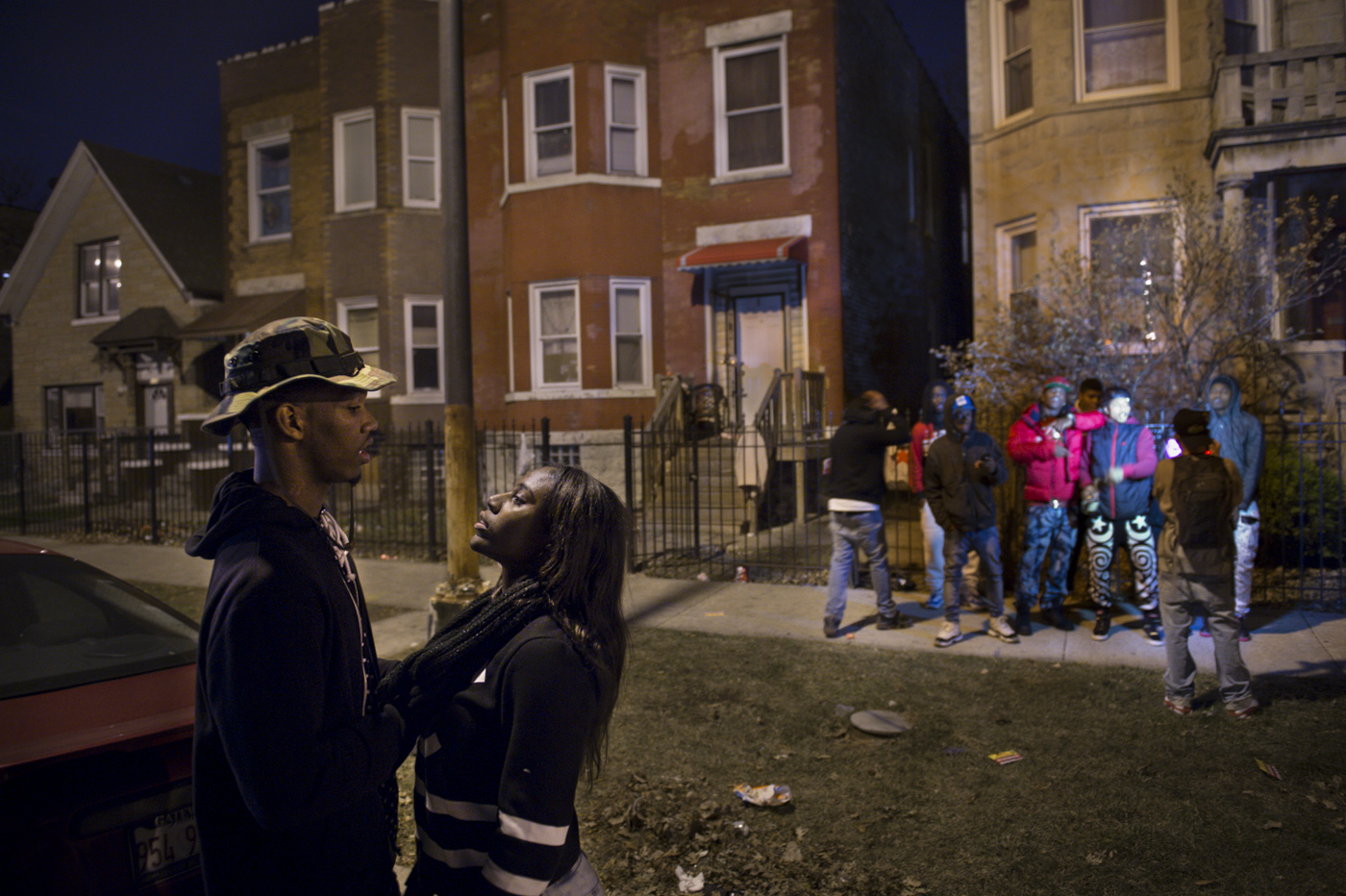
See my homies? They're all gangbangers. Black and white, red and black — those are like, gang colors. They all different gangs, too — GD, Vice Lord. Those are, like, the people that had my back in high school, especially Tommy — he the man done all my tattoos, but he's still a positive role model in my life. He's hood, but he has his goals, like to be a slash-rapper-slash-artist with tattoos. And this is the girl I was with. They're shooting a video because it's Tommy's birthday. They rap, and all Chicago people always wanna be in the rap game, make it big by rapping.
When I was in high school I was, like, still on my game with my crew, but they knew what I was trying to do. And they respected that 'cause I told them the truth. Even though we got into fights in the hood, beating people up, they made sure I stayed outta trouble, 100 percent. Like, I don't have a real family, but they was family to me. And I was still going to school — I made sure I went to school, regardless of the situation. And they had my back through it, thick and thin, even though I got in a lotta trouble with them. I regret it, but at the same time I still don't because it was with them.
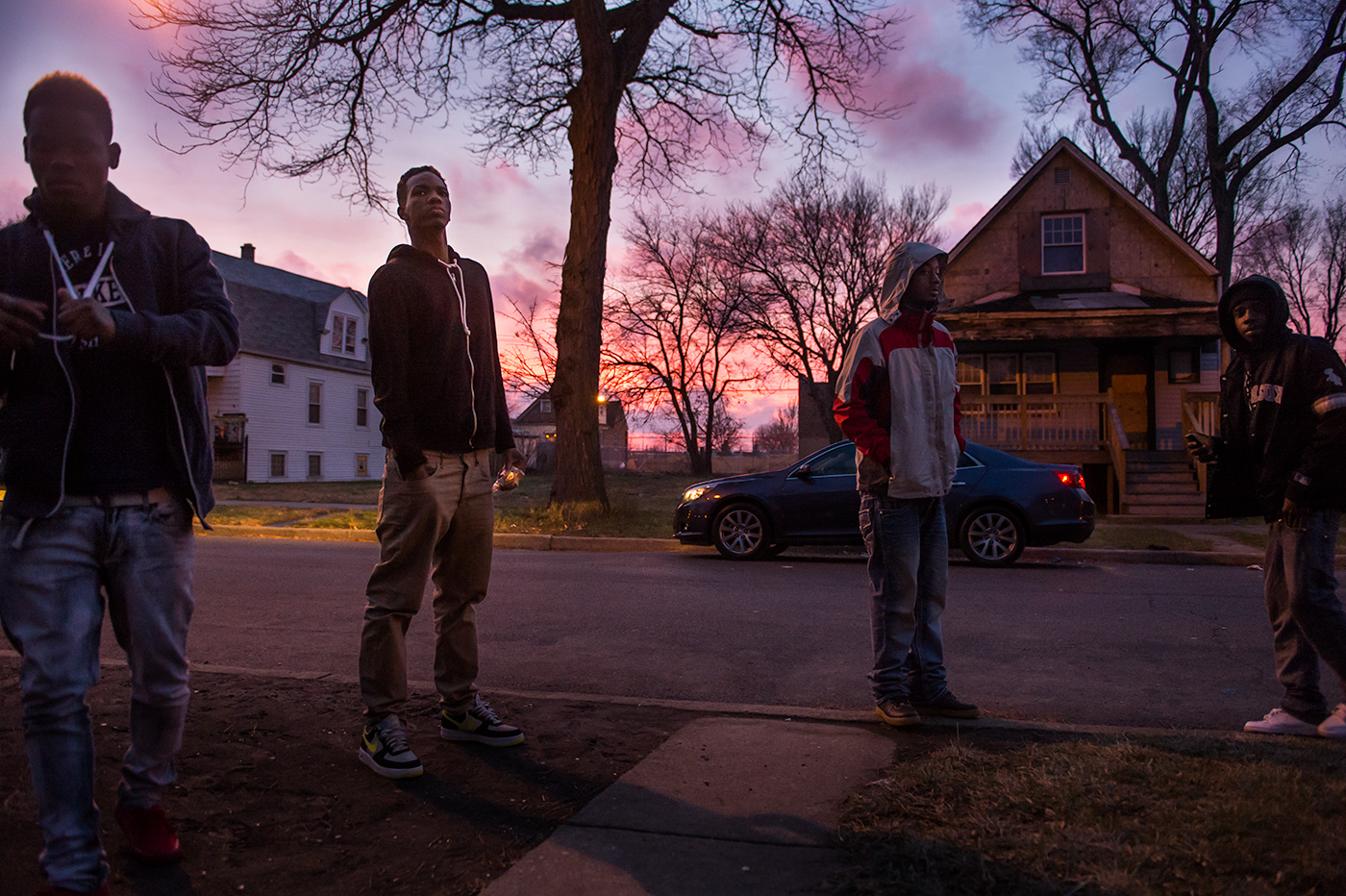
This is my cousin(right,center). That's his best friend(right). This is my brother (left). He has a peculiar style — slash-white-boy-slash-hood-nigga at the same time. He's my foster brother, like, the other half of my heart. This is like blood to me, 100 percent. I don't even consider him my foster brother. He knows everything I do, he know how I feel. We always do everything together. If he could come to college with me, I would be so happy, like, I would never drop out.
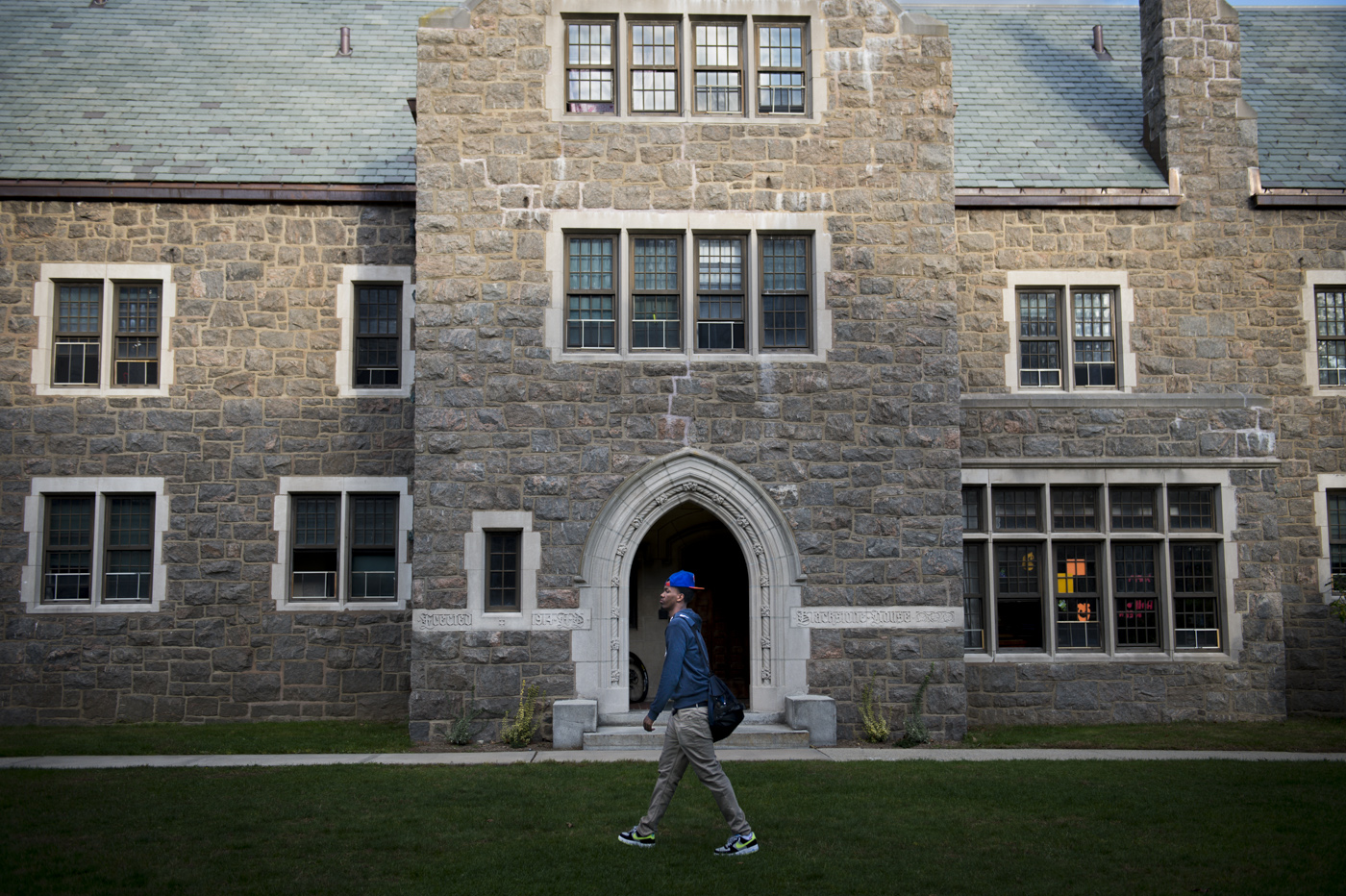
Tavaris Sanders walks past one of Connecticut College’s oldest dormitories the Backstone House erected in 1914.
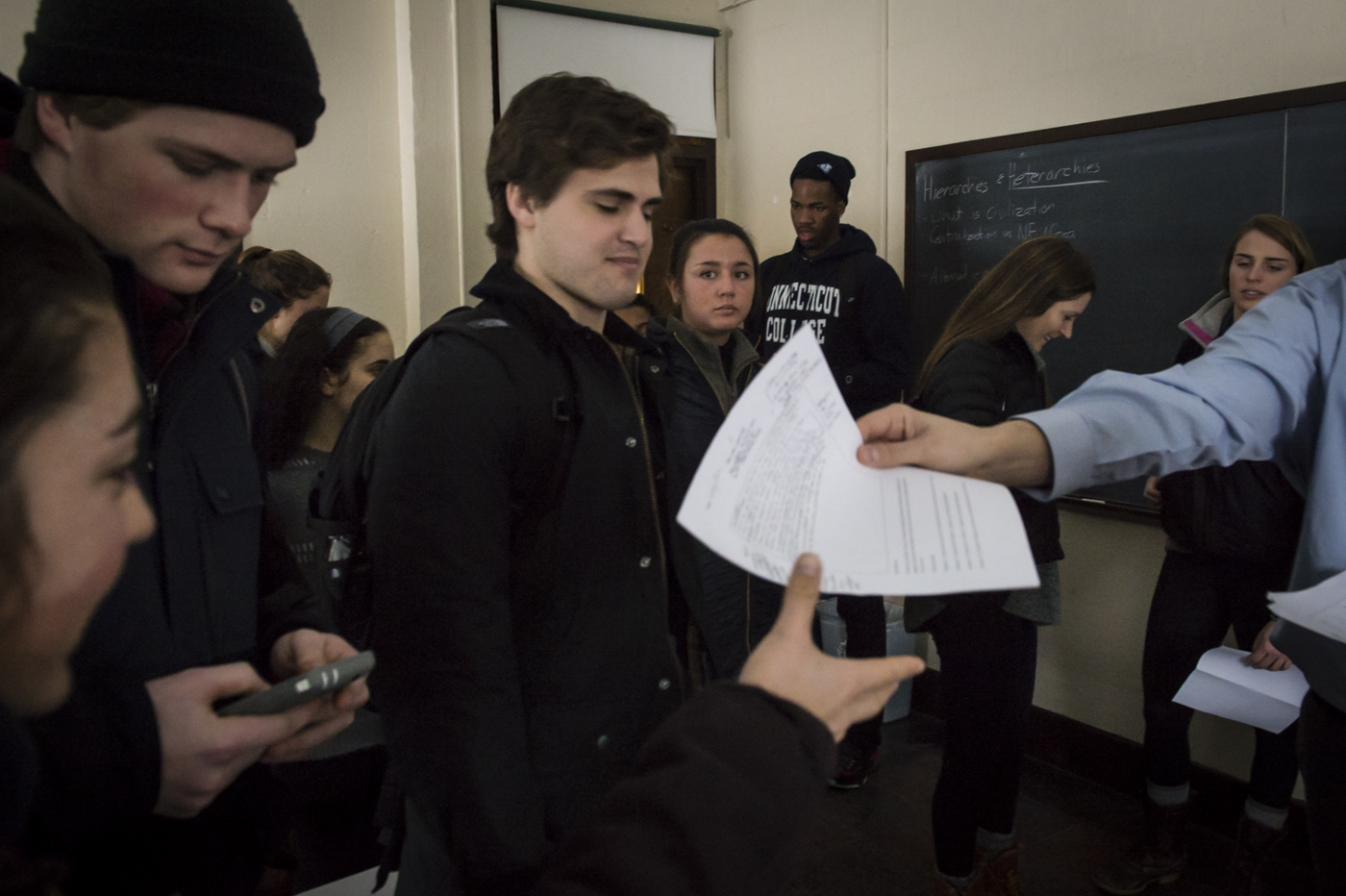
I'm always segregated in classes. I'm like the only black male in there, always, usually, most of the time. You can see I'm mad uncomfortable. Like, when they answer questions, the way they answer questions is so much more advanced than mine. And when they turn in their essays, I know my work is not as great as theirs, so I'm like, gonna turn it in last, tell the teacher the truth, like, I'm gonna need help. Because I already know you're expecting something great from me, but to be honest, I don't know how to do great yet, and I'm gonna have to let him know that.
I'm in the back of the class always, too, because I don't like being in front. And the work he gave out was just hard. It was African history. The way he explained stuff was like, What? Literally, I was confused. I used to go to his office hours all the time, because I used to struggle with the papers he gave us. He's like, Did you read it? I'm like, Yeah, I read it, but I didn't understand it. All these big words. I wanted to say that, but I was trying my best to keep my composure. I'm like, Bro, I read it, but I didn't really understand it, so that's why I'm coming to you.
Look at me: Aw, shit, they handing our papers back. I know I messed up. You can see I'm in the back. I'm gonna make sure I'm the last person so nobody see my grade.
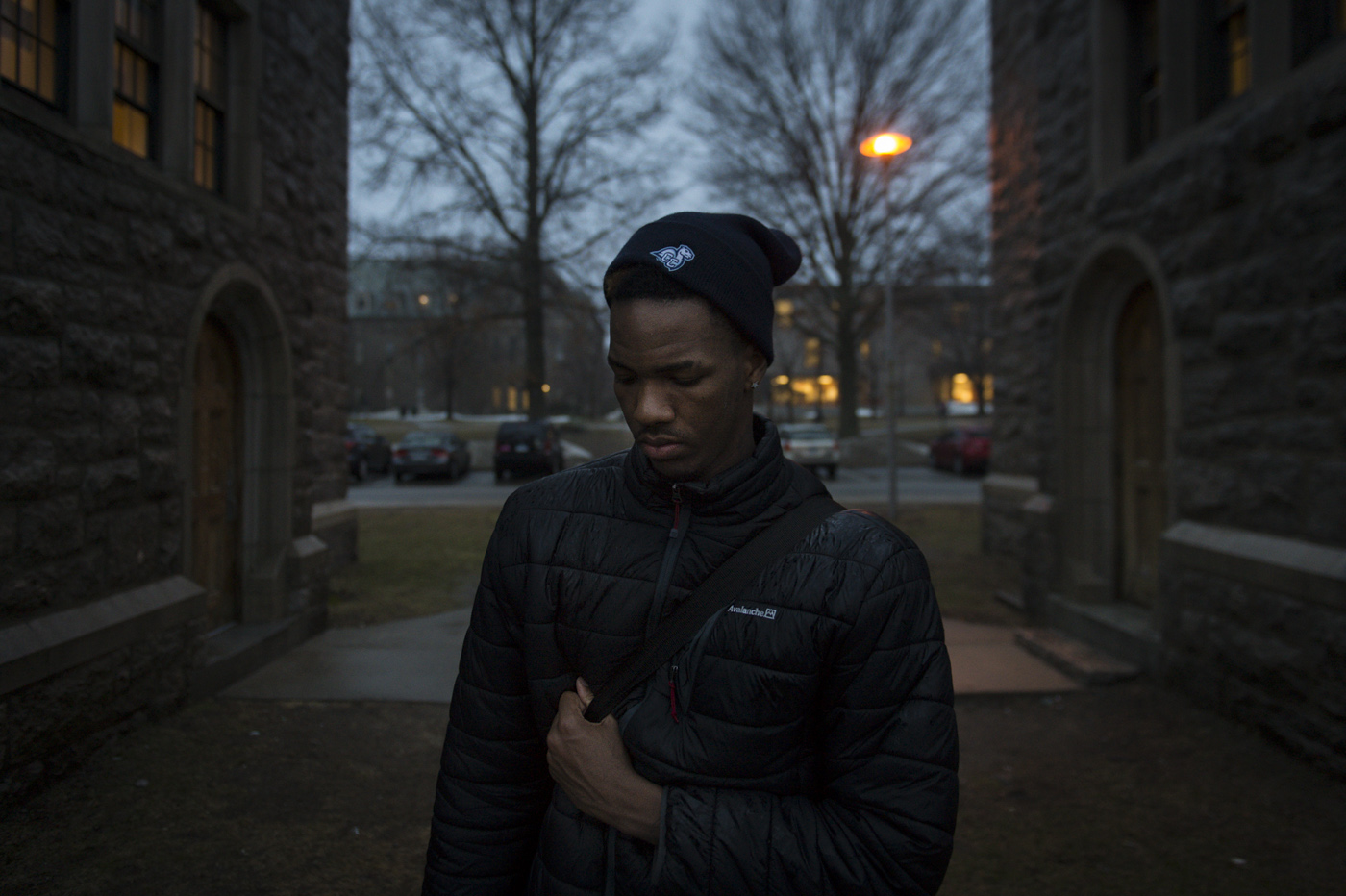
I got [to college] and I was just devastated. The two days I was here was nothing like the first week. I'm from Chicago, so like, where I come from we speak slang. The way we speak is not as proper as theirs. So when I talked, they never understood what I was saying. It irritated me. I know I can't speak proper English right now, but I'm trying. It's more like they was making fun of me, you know? Coming here, like, people study for hours, and they have all this advanced grammar and big words and I'm like, Yo, we did not learn this in high school. Whoa, the transition was so hard. And like, yeah, we're gonna do a five-page paper. What? We never did a five-page paper in our high school. It was more like a one-page paper.
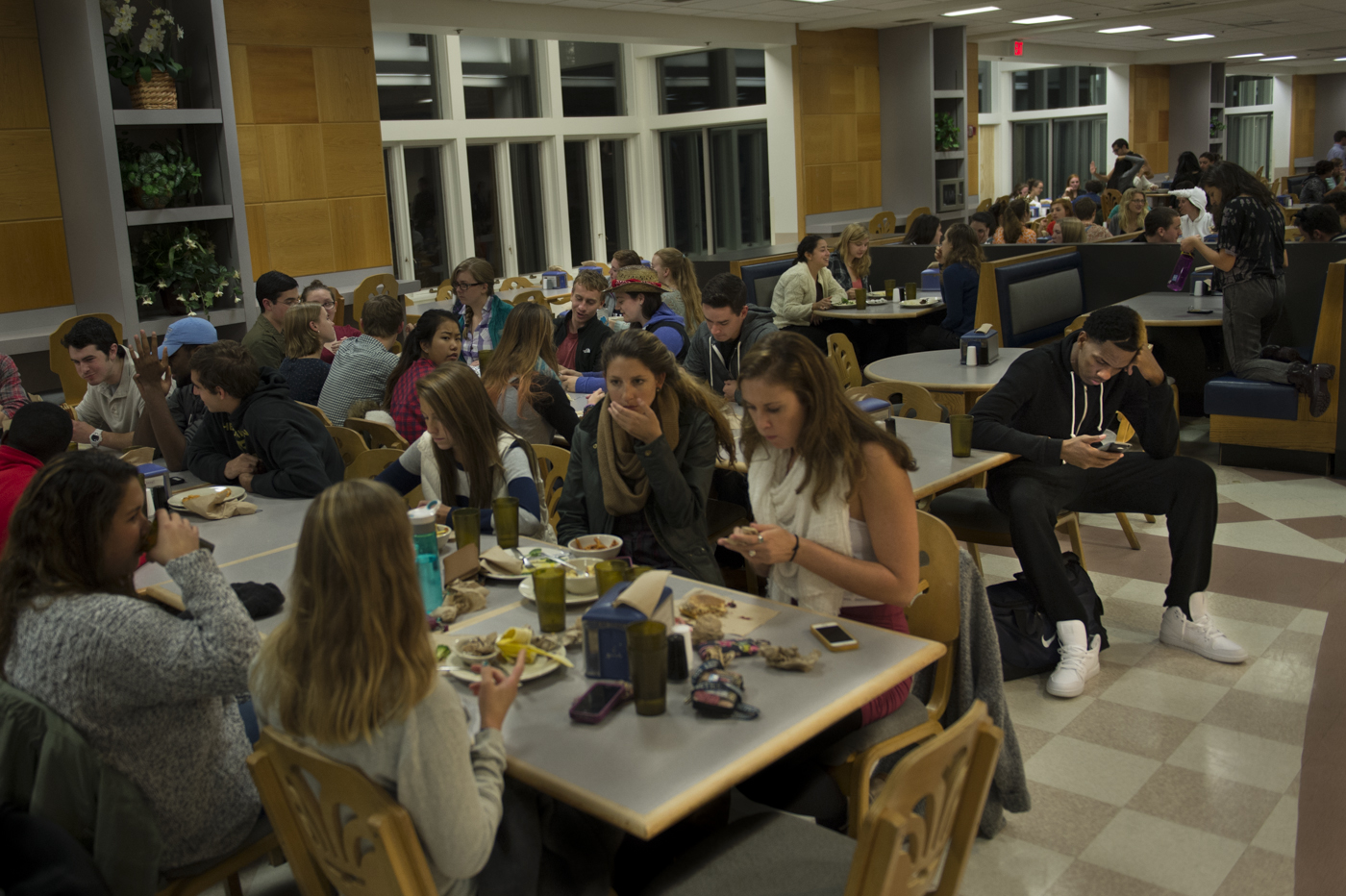
I feel like nobody want to talk to me when I get to lunch. It's always like, team with team, or the people you knew before you came here. Like right here, this is a basketball team, this like another small group — I think, a cappella or something like that. That's the male basketball team down there. And there's me, because I'm not on the basketball team or the girls’ basketball team or a cappella. It's just me. I sat by myself, listening to music, looking at stuff that's happening at home — dance videos, parties. I'm seeing what my brother doing. All the types of stuff that makes me happy. Being on my phone was a way to, not zone out, but I guess make myself comfortable while sitting there.
It became the norm. People would come up sometimes, like, Are you OK? I felt like they didn't care. Like, You see me by myself this whole time, why would you come up to me now? I'm fine, thank you for asking. They don't ask, Do you want to sit with us? I probably woulda sat with them — Hey, what's up, you know? It was like I just didn't fit.

Tavaris tries on a Halloween mask in his dorm room for his two roommates. Despite not enjoying drinking he like he needed to go to college parties and drink in order to fit in. Tavaris’ high school was less than 5 percent white. He has a very difficult time crossing the cultural divide.
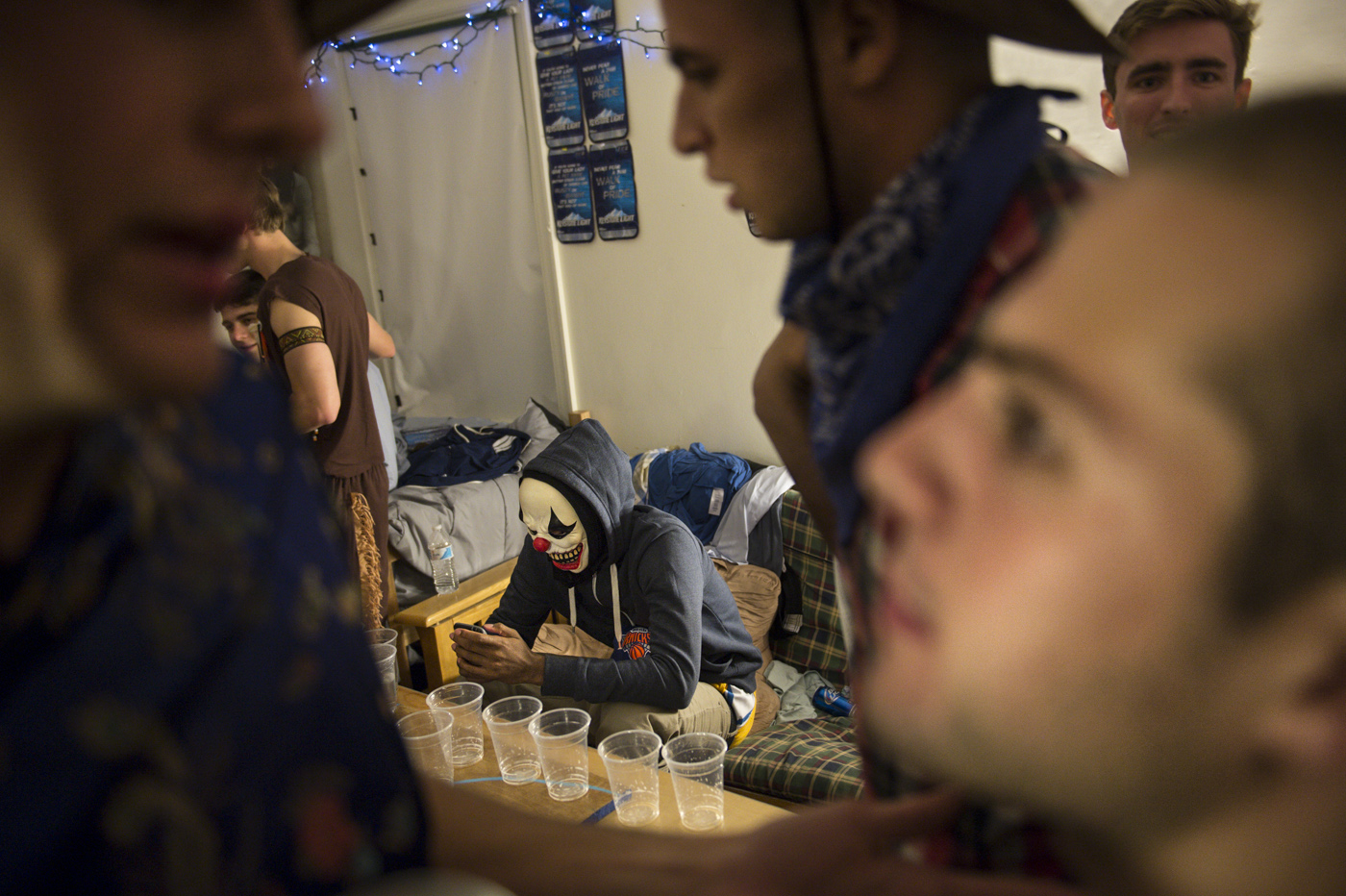
Halloween night. I was in a freshman dorm, but I was still in a room by myself. It was a quad, and there was a living room. I had a bunk bed, and it was just me. Boy, this picture — I'm just saying, like, Leave me alone. The stuff they're talking about has nothing to do with anything I would talk about. So they're drinking and playing beer pong. This is something new to me — I never played beer pong a day in my life. So I feel like, Let me just sit down and get drunk. I feel like when I drink I'm able to socialize more. I can like, I guess, improv and create a better conversation.
But I stopped doing that, ’cause I feel like that's not a good way to fit it, you know? So I'm trying to do it without being drunk. When I go out now, I won't drink, I'll try to talk to females and males about just random conversations I could think of. They bring stuff up, like, I don't know what you're talking about, to be honest, but it sounds fascinating, could you explain a little bit more? And they're like, Yeah, it's a book about this and a book about that. I'm, Oh, yeah, that sounds interesting, you know? Anything to continue the conversation. Back in freshman year, when they say a book, I be like, I don't know nothing about that. I made the conversation so boring, I made them leave. But now I be like, Oh yeah, tell me more about it. I'm able to try to get a feel for the conversation, try to escalate it more. I'm getting better about it.
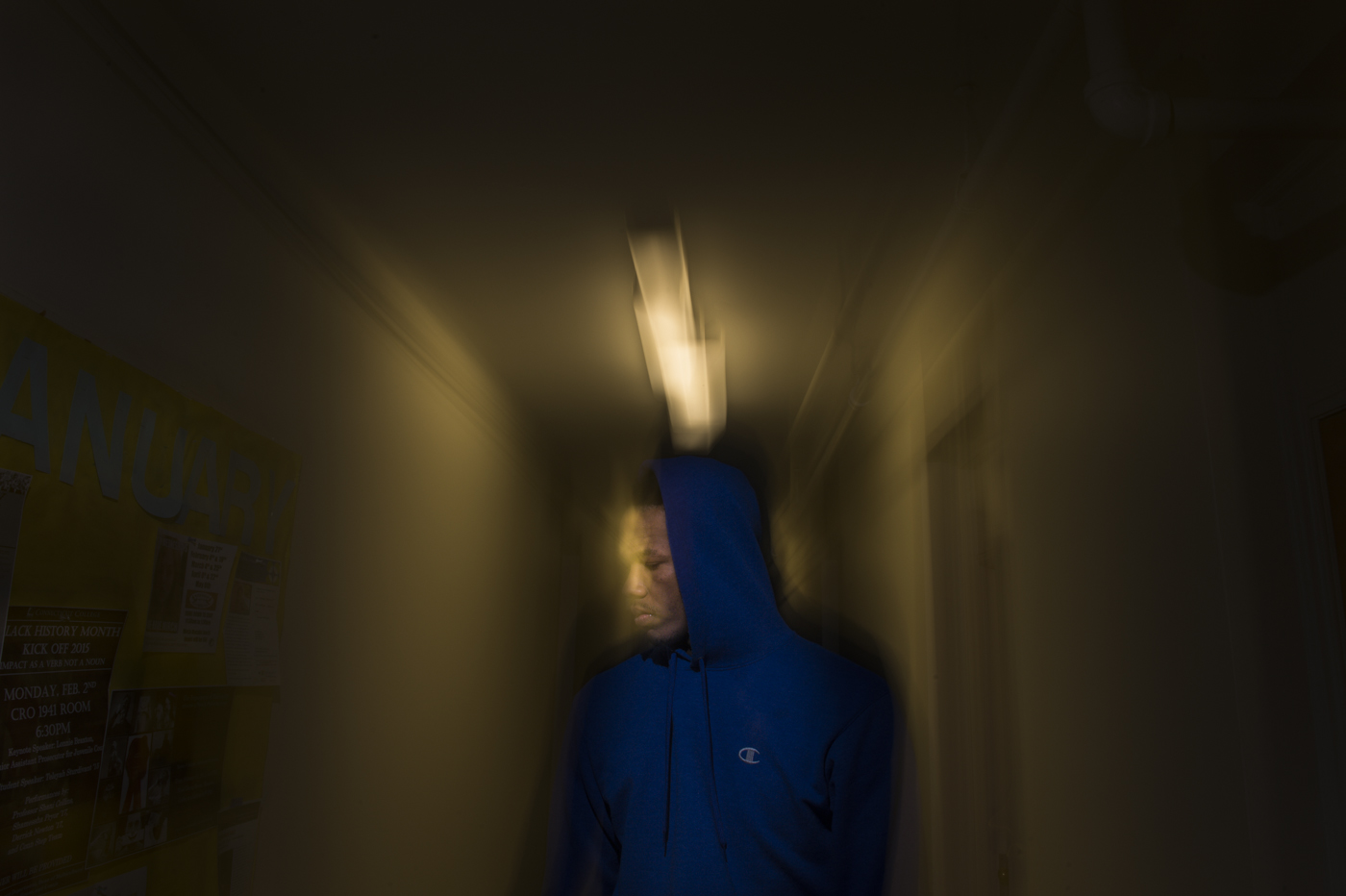
I don't belong here at all. Like, should I go home? Why am I here? I'm not comfortable at all. One night I was on the phone with my mom. I wanted to go back to the hood with my homies. And I had a girl, it was this long-distance relationship, and we ended up talking that night, and I was so angry. There was a point where I couldn't hold it in any more, it was all bottled up. So I just started screaming and stuff.
And my roommate came out, which is understandable, and he was like, Yo, you need to shut up. And I'm like, What? Bro, stop talking to me. You don't even know what I'm going through. He did not care about that, like, You need to shut up, I'm trying to go to sleep. And I started saying, You're fake as hell. And then my roommate grabbed me, and I'm like, Bro, you got five seconds to let me go, or I'm gonna beat your ass. And he let me go. And I'm like, Bro, if you ever do that shit again, I'm gonna beat your ass. And then I got into trouble.
The next day they sent me to the honor code, or whatever it is, and I had a meeting, and they wasn't even worried about what was really going on. They was like, You need not to do that anymore. You're disturbing students. I'm like, So you really don't care why I did that? You want to know the explanation? She said something, and it irritated me, and I just, like, shut down. Even still to this day I have problems, like, adjusting, and I still wanna leave. That's not gonna ever change.
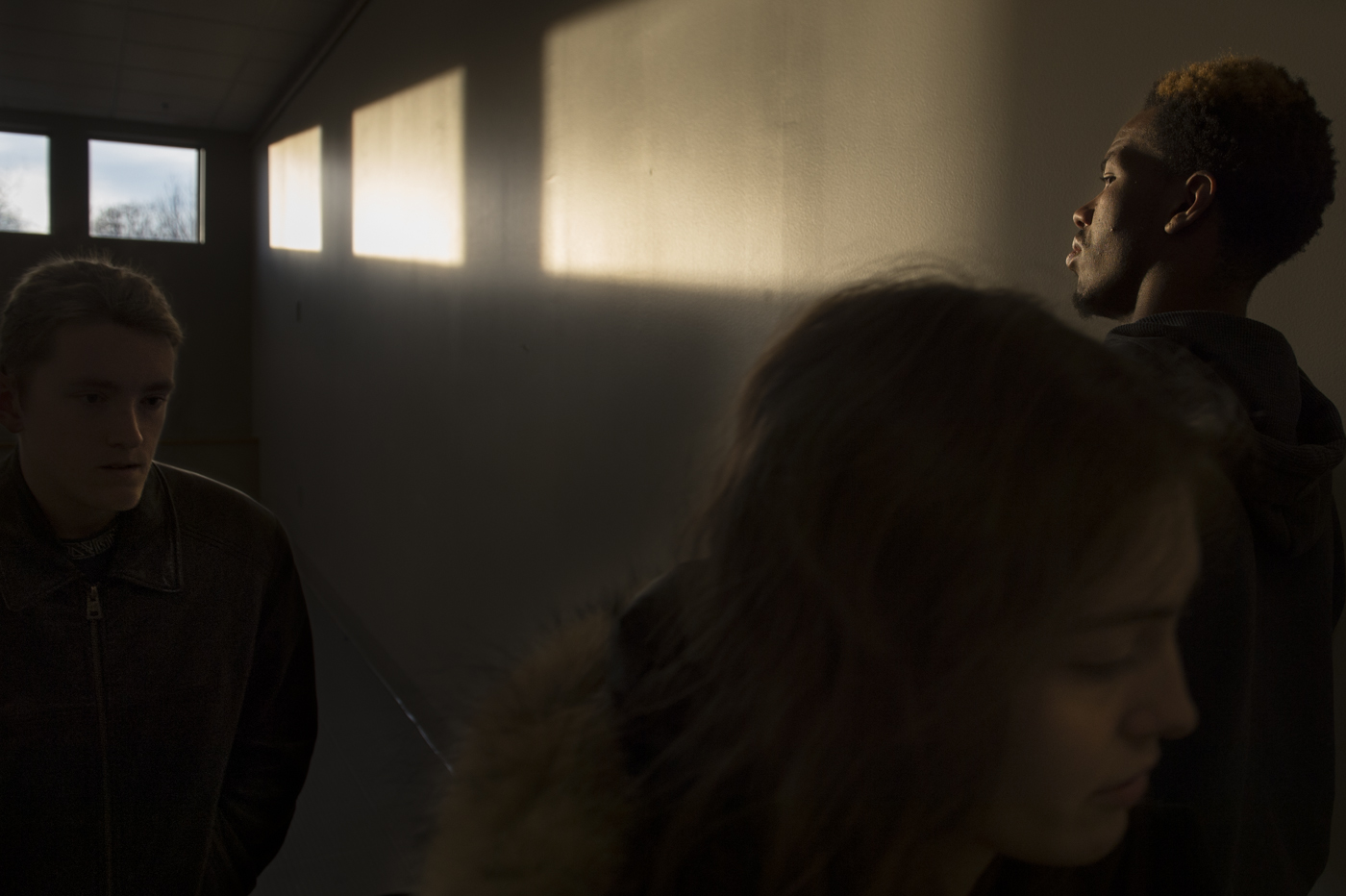
Tavaris rounded a corner on his way to the dining hall when two of his classmates approached. He smiled. Neither of them met his gaze.
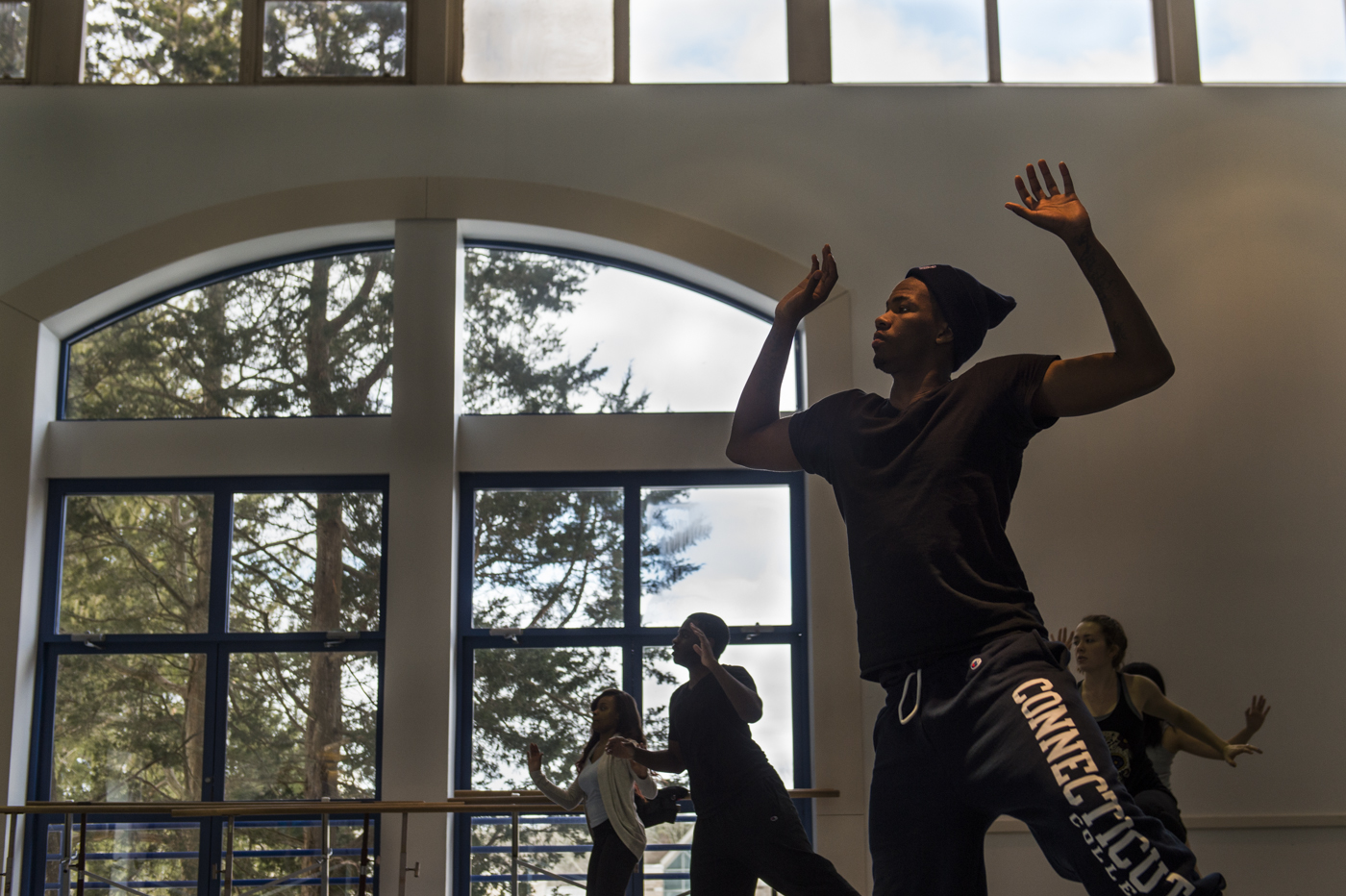
This is my Afro-Caribbean dance class. This is like a way for me to express myself, learning new dances, and to feel more comfortable with myself and why I'm here. It was an outbreak from being around that crowd of people who don't see what I see. I'm able to talk more about dance than any other subject.
My professor, Rosemarie Roberts, she's a great teacher. I was very into it, I loved it, even though it was a dance I never did a day in my life. I felt like her explaining the aesthetics of cool and the aesthetics of juxtaposition — learning all that, you can see what dancing can do. It's sorta like a second language. You're able to talk to people just by dancing. I loved this class. I felt like I knew everybody and what they did and what they loved, and we became close friends, just by dancing. And it was a way of me to open my mind, like I can show people how I really am.
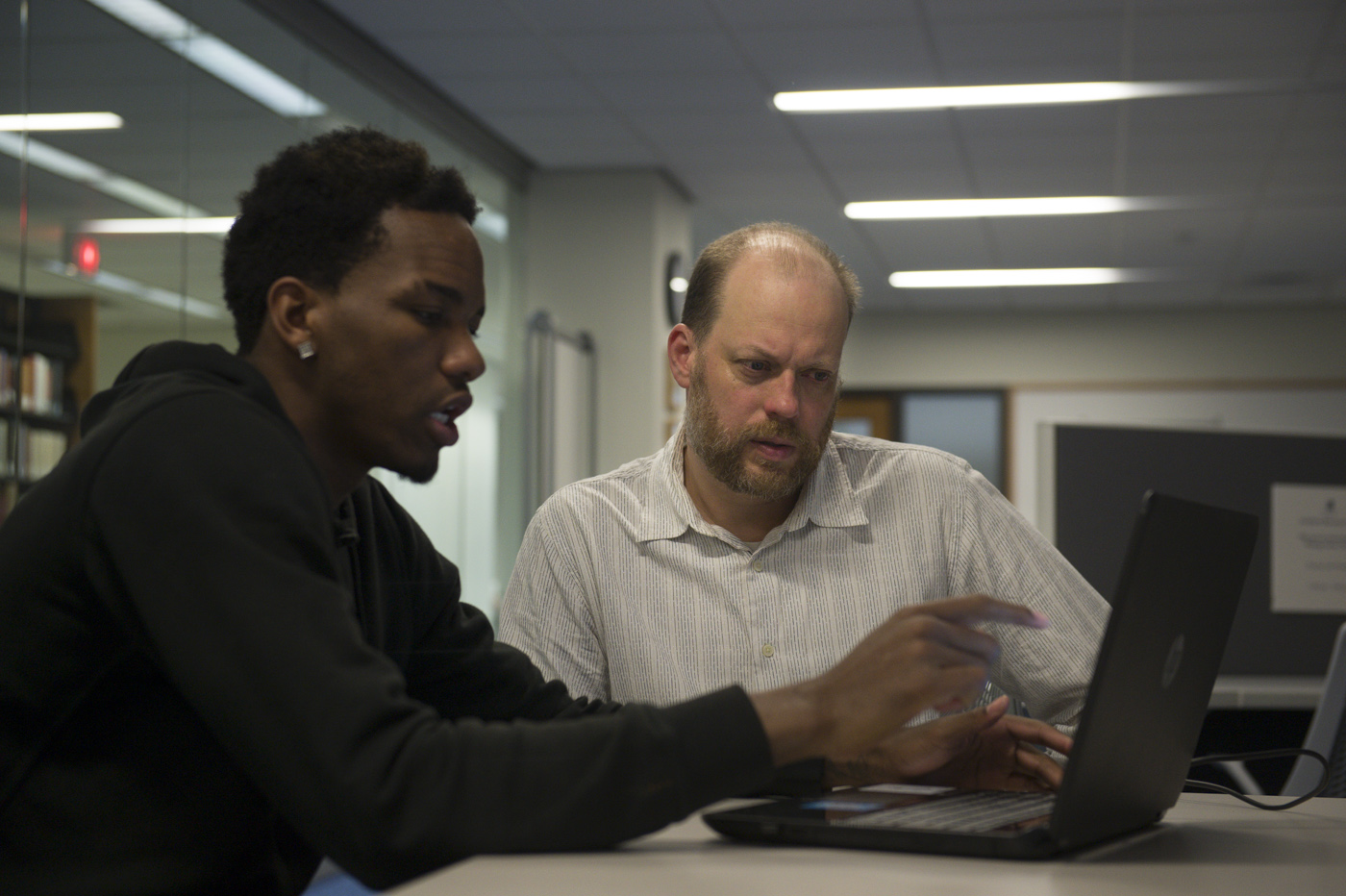
I went to the writing center because peoples was letting me know, Taz, you're messing up, you gotta change that. This is me being helped. Yo, I got this essay, I know the way it's worded is not the right way, could you help me out? Yeah, you're missing commas and punctuation and stuff like that. He's explaining what I could do with my paragraphs, my conclusion, my thesis statement. He helped me out. I feel like I got a little better at writing, but I'm still in the process of it.
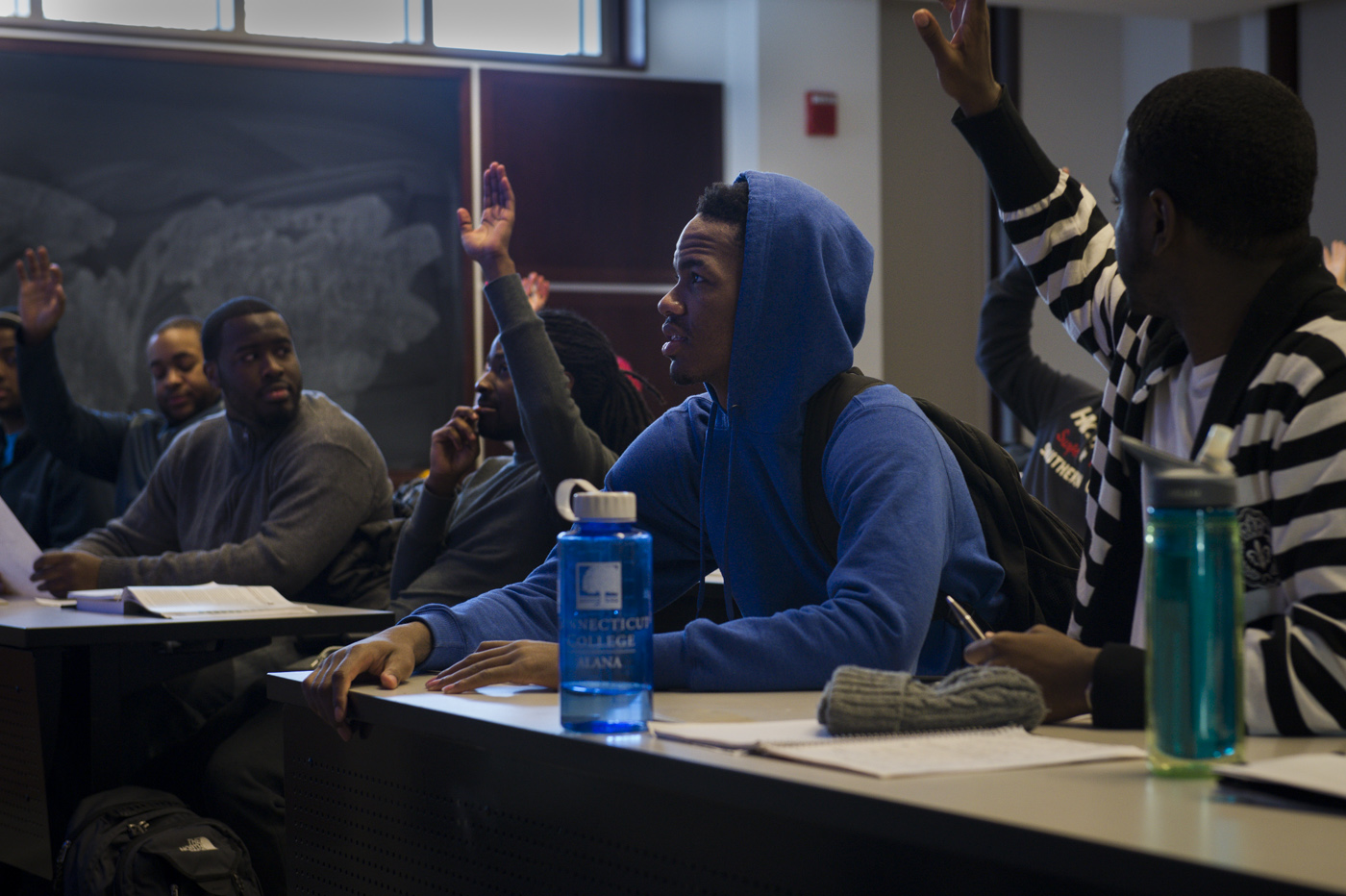
This is my Africana-studies class. I was very fascinated by this class — I wanted to know more about myself. And then, See all the black students in this class? It's just us. I love this class, ’cause he gets us involved. Like the way he talks — he talks the way I talk at home. He has slang. And there's white people in our class, too, but they don't feel belittled. He talks about white supremacy, he talks about everything, and he doesn't discriminate them. And they feel so comfortable, and they love it, like they wanna be Africana-studies majors, too. David Canton, he's my student adviser — this is the man I can relate to. He's the main one here that understands me. He's mad funny, hilarious. He's always busy, though.
This class is the start of me knowing what I want to do with my career. My first objective was to go back home and help those who want to be helped. David Canton's like, You know, you can't do just that. That's like just offering somebody a book and telling them to read it. You gotta have a plan. Like, you gotta have an organization, have people behind you. So I'm trying to figure out what particular thing I'm going to do to help my people. I wanna help people because people helped me throughout my whole life.
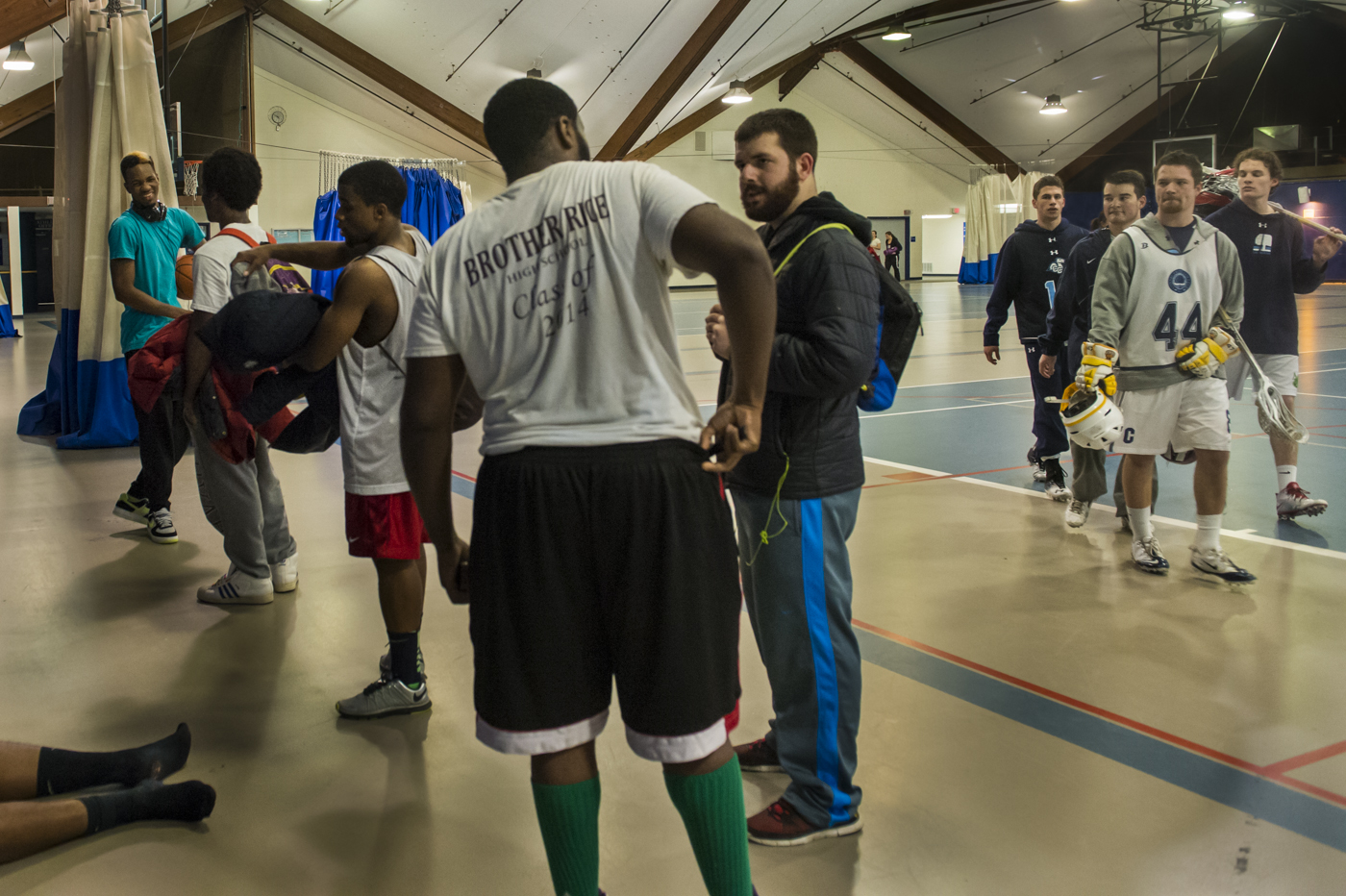
These are the players who don't play on the actual basketball team, but on the club. It's like a way for me also to express myself. I love playing club basketball. It's a diverse basketball team, but it's more a black scene than anything. Being on this team was like getting to know how people feel about this culture. Hearing all the people from club, I better understand what the college is and how they feel about it. And, like, now I can try to put my effort toward being better at this college after hearing what they have to say. Plus, you leave together, and you eat together, and then you play a game together.
And lax bros — you see how they're looking at us? Lax bros are like that. Facts. They have their own big-ass house. They're like the most top of all teams that think they're the best. And the girls just be on them like rats trying to get some cheese. Facts.
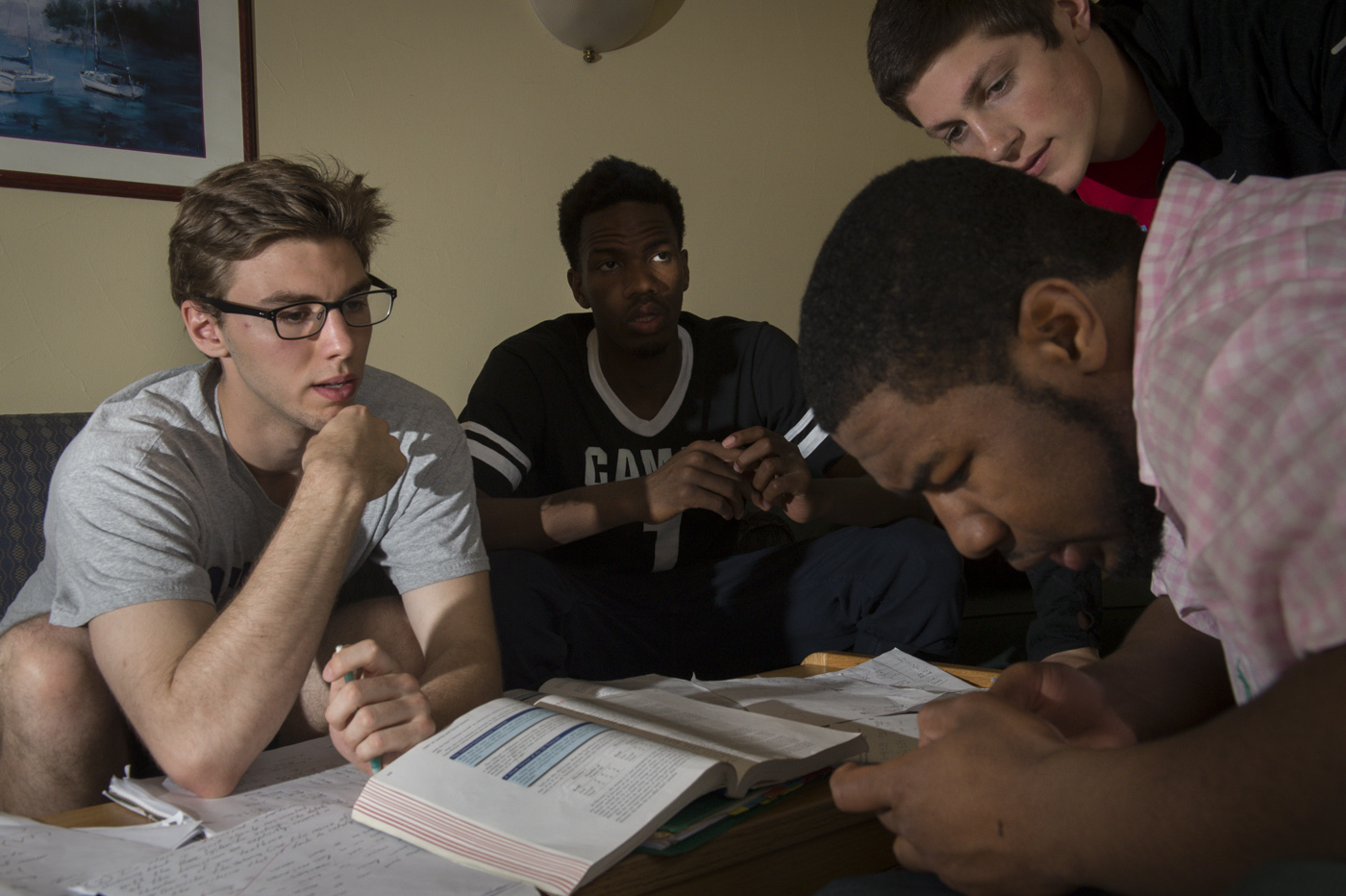
This is the basketball team during finals. We're coming together to try and get work done, and I'm trying to find somebody to help me. This is Isaiah in the pink checkerboard shirt, and there's Alex in the gray shirt, and there's Reed. He's like one of the coolest players on the lacrosse team because he actually talks to me. Isaiah and Alex are somebody who if I really need help they try to be there for me as much as possible, even though they don't really understand me, and I respect that. We was getting ready for finals in mathematical thought, and it's some weird stuff that I never heard about. I was so confused, but they was able to explain it and show me how to get stuff done. I felt a little comfortable with them helping me do the work because usually people don't help me with anything when it comes to work. I ask, and they, like, Yeah, let's meet up, but we never end up meeting up.
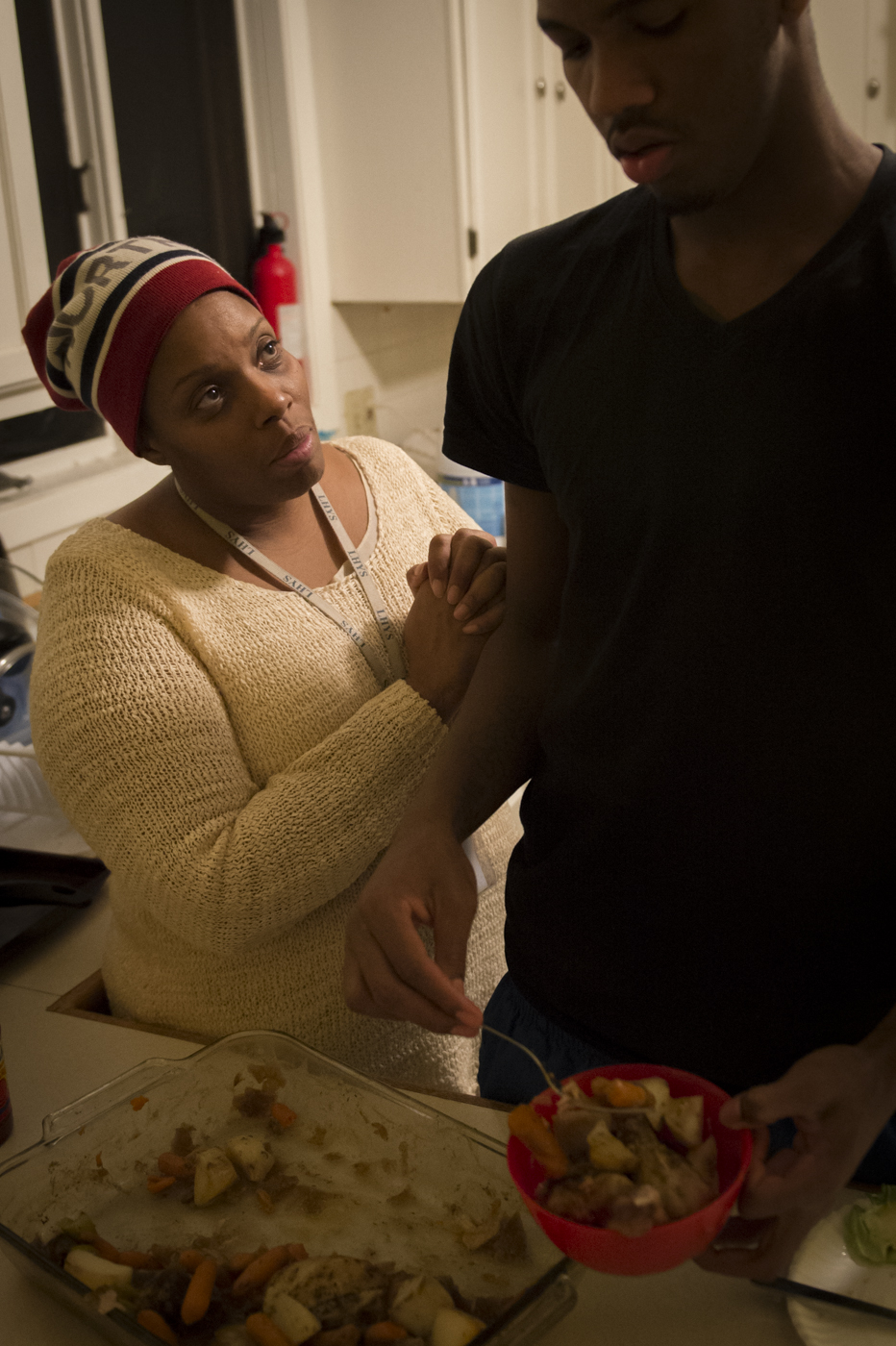
Me at the crib with my momma. My mom, she's like a huge part of my life. She understands me. She's always trying to get under my skin, because she knows what I'm capable of doing. She knows that I'm a bright, intelligent man, but sometimes I belittle myself because I feel like I don't belong to where I'm at.
So I came home and she's like, Taz, you're going back to college, right? She knows how to talk to me, and I love it because that's not even my momma. I have a lot of mothers that I call Mom, and she's the main one that can actually talk to me. Like, Taz, you need to stop, you need to do this, you need to do that, and I actually listen.
I never really wanted to come to college. I was like, Why? I did good in high school. I can get a job. I know people who know people who got people who got people. My mom was there, she's like, Taz, you gotta go. Get out of the city. There's a lotta bad things going on. There's shooters, there's killers. The way she explained it, she was right. I'm like, Let me stay here. She's like, Taz, you can't. You know what you're gonna do. You're gonna get in trouble, you're gonna do bad things. She was 100 percent right. And after thinking about it, constantly and constantly, I was like, I gotta go.
I feel like, the way she carries herself, and the way she explains things, it's so powerful. She's like an actual mother to me. And that soul food right there — potatoes, carrots, beef, looking good. It was flame.
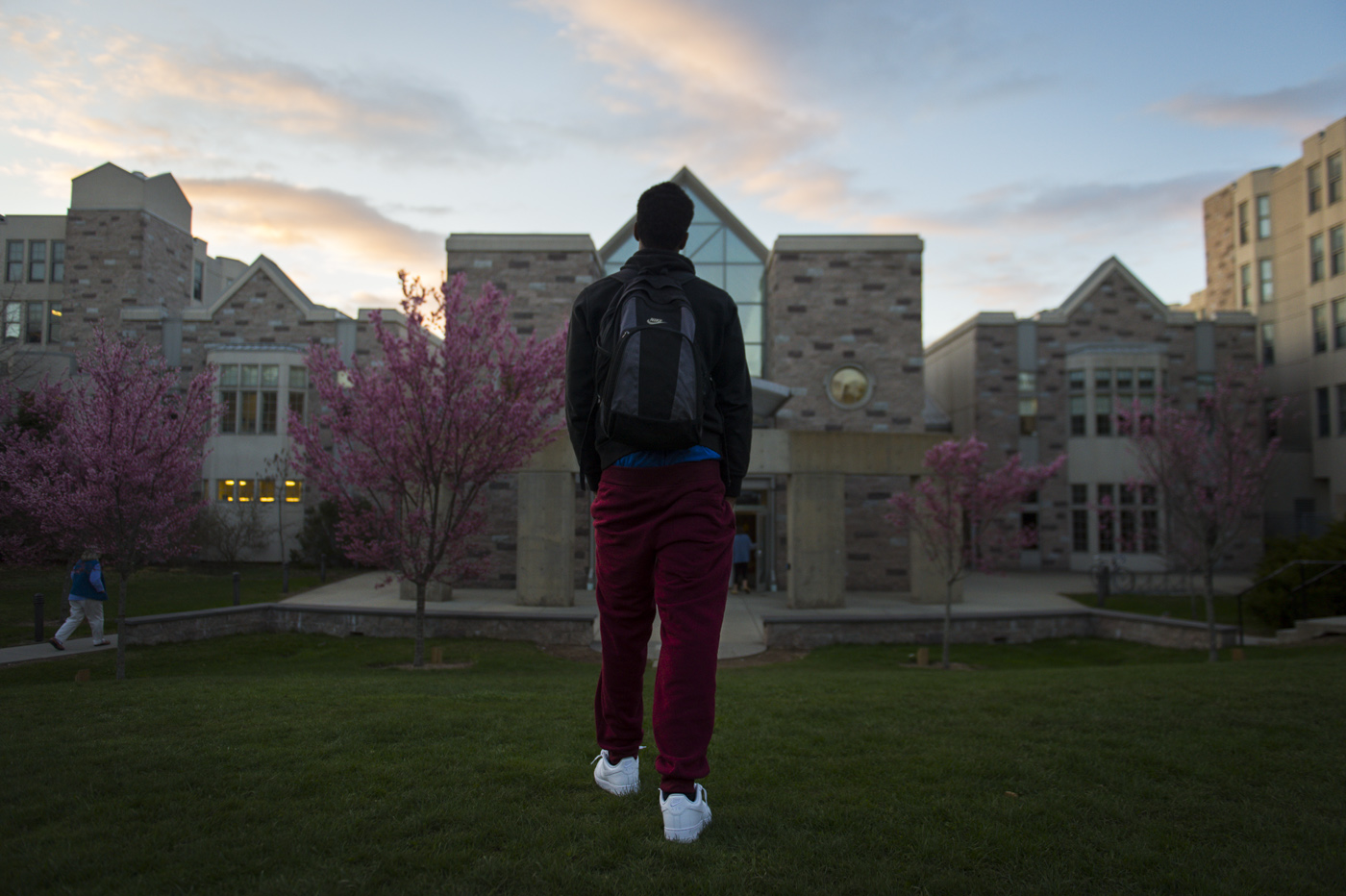
I'm trying to accept this place. I got a journey ahead of me, but I can do it. Yeah. Imagine me being here. A black male from the hood, coming to a college like this. It's so weird. Facts.



















